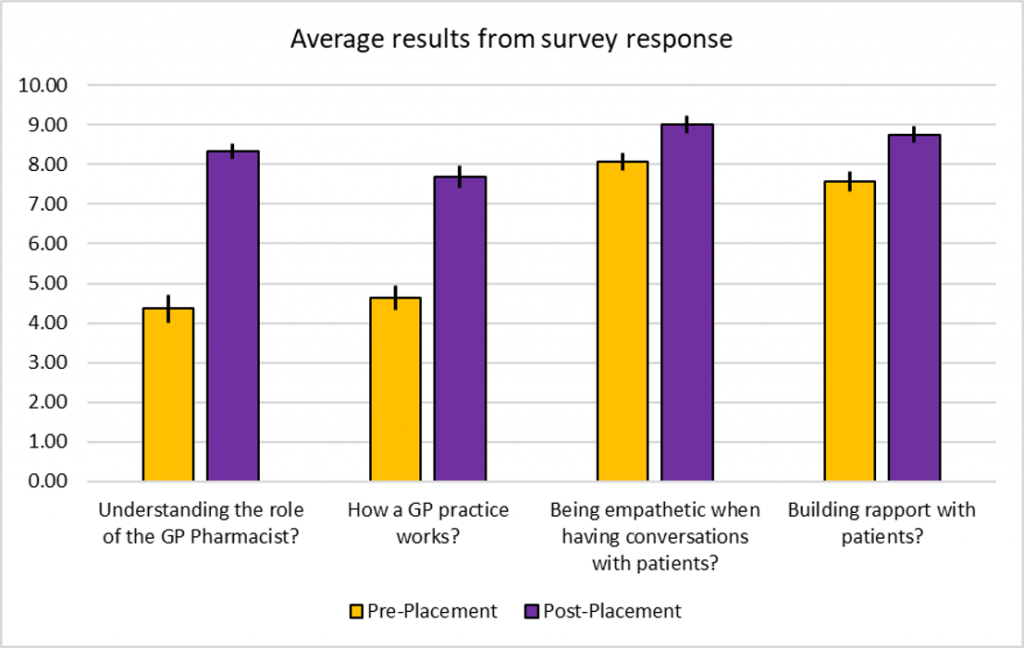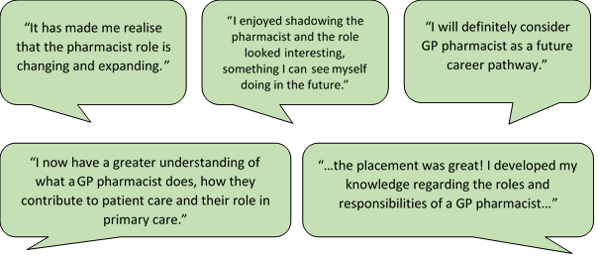Catherine Langran, Lecturer in Pharmacy Practice, School of Pharmacy
Daniel Mercer & Selen Morelle, MPharm Part 4 students, School of Pharmacy
Background
Throughout the Masters of Pharmacy degree (MPharm) students undertake experiential learning in hospital and community pharmacies. Experiential learning through placements is an important approach to teaching and learning; providing a safe learning environment for students, bridging the gap between theory and practice, and encouraging independent learning and reflective practice.
In 2016, the National Health Service (NHS) launched a programme “Building the General Practice Workforce” creating a new career pathway for pharmacists performing clinical tasks in a primary care setting. Over the past 3 years a steadily increasing number of pharmacists are pursuing this career option, and this is now a graduate opportunity for our MPharm students. It is therefore crucial that Reading School of Pharmacy provides undergraduate students with an opportunity to experience this new role to give students more insight into their career options, encourage professional and personal development, and boost employability.
This collaborative partnership project piloted placements within GP practices for Part 3 pharmacy students to assess the students’ perceptions and evaluate the benefits and practicality of the placements.
Method
59 Part 3 students (46% of the cohort) attended a voluntary session in November 2018, prior to submitting the PLanT application. This session demonstrated a high level of student interest in this placement opportunity and also involved discussion of the practicalities (e.g. placement length, positioning within timetable, location) and perceived advantages of offering GP placements.
Following a successful bid to the PLanT fund, a second voluntary session was attended by 22 students who collaboratively worked with the project lead to determine the process of student recruitment and allocation to placements, define the placement learning outcomes, placement activities, evaluation methods and how to collect feedback. Subsequently, the two project lead students worked with the lead academic to construct an online application process, review student applications, finalise the student handbook and evaluate the student feedback.
The main objectives of this project were:
- To evaluate the benefits of undertaking the GP placements for MPharm students.
- To evaluate the placement provider’s feedback on the acceptability, practicality and scalability of providing placements for students.
Five GP practices were recruited to take part in the pilot, located in Reading and London. From April-June 2019, a total of 37 part 3 MPharm students completed a half to one day placement in one of five GP practices. Students predominately shadowed the GP Pharmacist within a clinic environment, and others had the opportunity to shadow GPs, nurses, physician associates and reception teams to provide a greater understanding on how General Practices function as a business.
Data was collected via student completion of online questionnaires pre and post GP placements to compare their:
- Understanding of the role of GP pharmacists and how GP surgeries work (with 0=no knowledge to 10=complete knowledge)
- Confidence building rapport and being empathetic when talking to patients (0=no confidence to 10=fully confident)
Students also decided that they would like to prepare and deliver a short 5-minute verbal presentation to their peers and the project group to share experiences and insights from their GP placement.
We also collected feedback from placement providers after completion of the placements.
Results
37 students completed the pre-placement questionnaire, and 30 students completed the post-placement questionnaire. Analysis of the data shows that the students who undertook the placement displayed a significant improvement in their understanding of the GP pharmacist role and the structure and running of a GP practice. A moderate increase in empathy and building rapport was also seen.

Students’ evaluation of the GP placements were overwhelmingly positive, highlighting improved knowledge of the role of GP pharmacists and having gained insight into their potential career choices:

In their peer presentations, students described key learning points:
– An understanding of how different health care professionals skills can work together to offer best care to patients
– The value of observing pharmacist consultations with patients, and reflecting on how treatment decisions are made
– An increased understanding of the options available to them after graduation, enabling them to make a more informed career choice.
Feedback from placement providers showed they found hosting the placement enjoyable/rewarding, they felt the students were enthusiastic, and the organisation/communication from the university was excellent.
Limitations
Whilst the cohort of students who attended the placement days appear to have improved their understanding of GP pharmacy, we are aware that the students undertook the placements voluntarily. These students had a desire to explore the role of GP pharmacists and this implies that they had an interest in the area prior to undertaking the placement. Therefore, opinions may be favoured towards the role.
Impact
The student co-design element ensured this pilot delivered an authentic and valuable experience, with high levels of student engagement.
As a result of this pilot, funding has been secured from our Head of Department to implement GP placements for all part 3 students (cohort size 106) from December 2019. Working partnerships have been established with the 5 GP practices and this has now been expanded to 16 GP practices for 2019/2020. Embedding GP placements for our students will have a positive impact on the MPharm re-accreditation by our regulators the General Pharmaceutical council in March 2020.
There is the potential for this project to have a long term impact on NSS and employability which will be explore in June 2020. Offering these placement sets us apart from other Schools of Pharmacies, and is a key selling point in our new UCAS brochure.